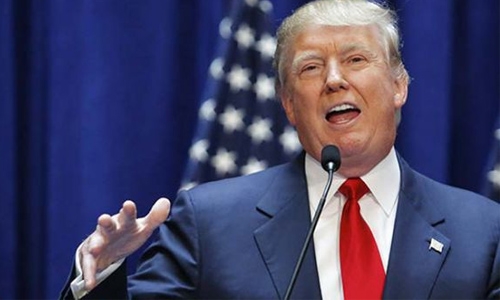New York : US President-elect Donald Trump made fiery foreign policy remarks and vows including taking all of Iraq’s oil in compensation for the 2003 war.
Under the US constitution, Trump now doesn’t formally take the reins of power until January but he will begin the transition to his presidency almost immediately.
According to a report in Independent, Trump, who has no foreign affairs or military experience, will confront the absence of a national or even Republican political consensus on how to deal with Syria, ISIS, the rise of China and a newly assertive Russia.
“This is virtual terra incognita,” said Aaron David Miller, a Middle East negotiator who served Democratic and Republican presidents and is now with the Woodrow Wilson Center for Scholars in Washington.
“The biggest danger of a Trump presidency is the unpredictability and sheer lack of stability that our allies and adversaries would feel, and he turns that into a virtue by saying that he wants to be unpredictable,” Miller told Reuters.
However, here are the latest reactions regarding Trump’s previously said agendas on the Middle East:
1- Iran nuclear deal
President Hassan Rowhani said on Wednesday the US election results would have no effect on Tehran’s policies, according to state news agency IRNA.
Iran’s Foreign Minister Mohammad Javad Zarif said in Romania that Trump must “stick to agreements” and “to understand the realities of today’s world.”
Iran’s nuclear deal was both divisive inside Iran and the United States.
Republicans were vehemently against the deal - its preliminary framework agreement reached in 2015 - between Iran and the P5+1 powers. In Iran, hardliners opposed to better relations with the West argued that pragmatist President Hassan Rowhani was giving up too much of the country’s nuclear infrastructure for too little relief.
2- Siding with Russia’s Putin, Assad’s No. 1 ally
Trump’s policy is to favor “strong men,” making Russian President Vladimir Putin a priority.
He also criticized Democrat’s candidate Hillary Clinton – whom he defeated after Tuesday’s elections, that her plan for Syria would “lead to World War Three,” because of the potential for conflict with military forces from nuclear-armed Russia.
In reaction to Trump’s friendly tone to Putin, the Russian leader said on Wednesday that Russia is ready to do its part to fully restore ties with Washington.
Putin is Syrian President Bashar Al-Assad’s main ally. Russian support and its aerial backing to Assad’s forces were tactical in aiding and sustaining the Syrian regime.
Trump being the new president could spell a tectonic shift in the US foreign policy on Syria, with a strategy more aligned with that of Putin’s.
Obama’s administration has long supported what it called as US-vetted moderate Syrian rebels.
3- Forming coalition with Russia, NATO on ISIS
Trump, who has long accused former Secretary of State Hillary Clinton and Obama, for allowing ISIS to be a global threat, said he would work with Middle Eastern states such as Israel, Jordan and Egypt to battle ISIS.
He also believes in teaming up with both Russia and NATO to form a coalition to coordinate aggressive military missions to defeat ISIS, especially by limiting their funding and sharing intelligence.
Trump also wants to keep these plans secret so ISIS will be surprised.
4- Fighting "radical" Islam
One of Trump’s plans to completely defeat ISIS is to engage in what he describes an "ideological warfare" similar to how the US “won the Cold War,” and that’s through exposing the menace emanating from communism.
He said: “Just as we won the Cold War, in part, by exposing the evils of communism and the virtues of free markets, so too must we take on the ideology of radical Islam.”
The new president said he will form a commission that teaches people to recognize radical Muslims and disable groups that make it possible.
5- Temporarily pause immigration from certain countries
Obama and five other predecessors have used their executive powers to temporarily ban certain immigrants — including Muslims — from entering the United States, The Washington Examiner reported.
While Trump is vowing to temporarily pause immigration from certain countries especially the ones that do not share values with the United States, this could add more to the screening and ban for those coming from Muslim countries.
6- Jerusalem as Israel’s "capital"
Trump has a far more partisan support for Israel. Israel’s Justice Minister Ayelet Shaked called on Trump to follow through on his promise to move the US embassy from Tel Aviv to Jerusalem, in a break with the consistent policy of successive administrations -Republican as well as Democrat.
It is internationally uncontested that Eastern Jerusalem should be the future capital for the Palestinian state.
While both Trump and Clinton champion pro-Israel stances, Israeli Education Minister Naftali Bennett said the idea of a Palestinian state was over after Trump’s election win.
However, Palestinian President Mahmoud Abbas said on Wednesday that he hopes “peace will be achieved during his term,” highlighting Palestinians’ keenness to be close to Trump amid his obvious impartiality towards Tel Aviv.
7- Turkey sees him as ‘beneficial’
Turkish President Recep Tayyip Erdogan – key ally for Putin - says he hopes Trump’s win marks a new era in the United States, and hopes the new US president will lead to “beneficial” steps for fundamental rights, liberties and democracy in the world.
Addressing a business group in Istanbul on Wednesday, Erdogan also said he hopes the election result would also be auspicious for the region.
While Trump wants a coalition with NATO on ISIS, he has questioned whether NATO, an alliance of Western nations formed to counter the former Soviet Union, is outdated.
In July, Trump said the United States might abandon its NATO military commitments, including the obligation to defend members against attacks.
While the move could possibly affect Eastern European countries, Turkey so far - one of NATO’s main members – doesn’t seem to be bothered.

